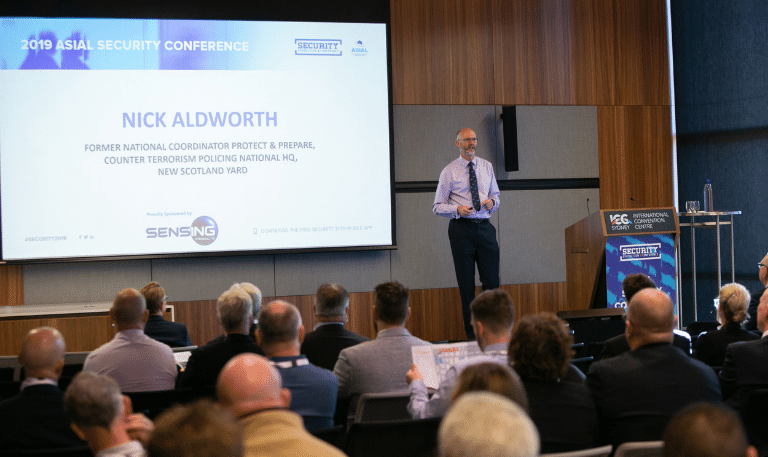Public Private partnerships to combat terrorism
An effective response to the changing nature of terrorism required unprecedented levels of cooperation and information sharing between police agencies and the private sector, according to a leading British counter intelligence expert.
Speaking at the 2019 ASIAL Security Conference in Sydney, Nick Aldworth—who recently retired from his role as the UK’s Counter Terrorism National Coordinator—said the nature of modern terrorism was “indiscriminate”, un coordinate and random, and largely designed to kill or injure people rather than damage property.
“Today, anybody and everybody can be a terrorist, not only in the name of Islamic State but also in the name of extreme right wing beliefs,” he said.
Aldworth contrasted a 1992 attack on the city centre of Manchester by the Irish Republican Army, which created 10 million pounds of property damage but killed no one, to the 2017 Manchester pop concert attack which killed 22 people and injured 220 but inflicted very little property damage.
The IRA warned police of its attack, the aim of which was to force the British Government to the negotiating table, while the lone terrorist responsible for the 2017 attack was a suicide bomber intent on killing as many people as possible.
“We realised that these ideologies were very different and that we in the policy and intelligence community could not do this on our own,” he said.
“We weren’t going on the front food to the British public and saying ‘you are going to have to start looking after yourselves.’
“The first duty of the state is to protect its citizens, but I don’t think we live in that world any more and we have to facilitate the ability of the citizen to look after themselves.”
While the UK had 120,000 members in the various police forces, there were 340,000 license security industry professionals and probably as many more working unlicensed.
The police and the authorities made a decision in 2017 to reach out to the security industry and the business sector and enlist them in the fight against terrorism in a program called “Step Change”.
“But one of the first things which happened then was that business came to us and said ‘look you are calling on us to look after ourselves, but you are not telling us anything, you are not sharing with us, how do we know what we are supposed to do,’” said Aldworth.
“That was actually a fair challenge, because we weren’t talking to business and we weren’t sharing information.”
The “gamechanger” came with a new executive appointment who began talking about “daring to share” with the private sector, and this new approach yielded results.
“I had spent my entire life as a police officer or in the military not sharing,” said Aldworth.
“So we had to break down that culture, and get on the front foot and find trusted people in the private sector we could talk to.”
“The key to everything we did was to get out from behind the shield of secrecy and realise that we were there for a purpose which is to protect people, but you can’t do that on your own.”
In 2017, the UK created an industry advisory group specifically for counter terrorism which includes corporates such as the Virgin Group, the Premier League, events producer Live Nation, PWC, airports operator BAA, car rental company Hertz and Canary Wharf, which manages the UK financial centre in London.
The Step Change program then identified a number of areas of focus: transport, crowded places, security resilience and tourism. Cyber security and finance were also identified, but were considered specialist areas best dealt with by expert agencies.
“We are doing five projects in each of these areas, and I think we are moving fastest in tourism,” said Aldworth.
“We have worked with travel providers to ensure that every single representative working for a UK company who meets a British person in a foreign hotel has been trained in counter terrorism.”
By the end of the year, it is hoped to create a system whereby British people who arrive in foreign countries will receive messaging on emergency contacts and any relevant warnings to their smartphones.
“The best thing about these changes is that I am not delivering them, it is the private sector delivering them,” said Aldworth.
“But this requires a cultural change. As a young police officer I looked on the security industry almost as an enemy than a friend, and we have to break that thinking.
“Because unless we nail this piece about working with the private sector we won’t succeed in keeping our nation secure.”
Nick Aldworth was speaking at the 2019 ASIAL Security Exhibition & Conference at the ICC in Sydney’s Darling Harbour.
-
Stay up to date with the latest news and Security updates.
- Subscribe

